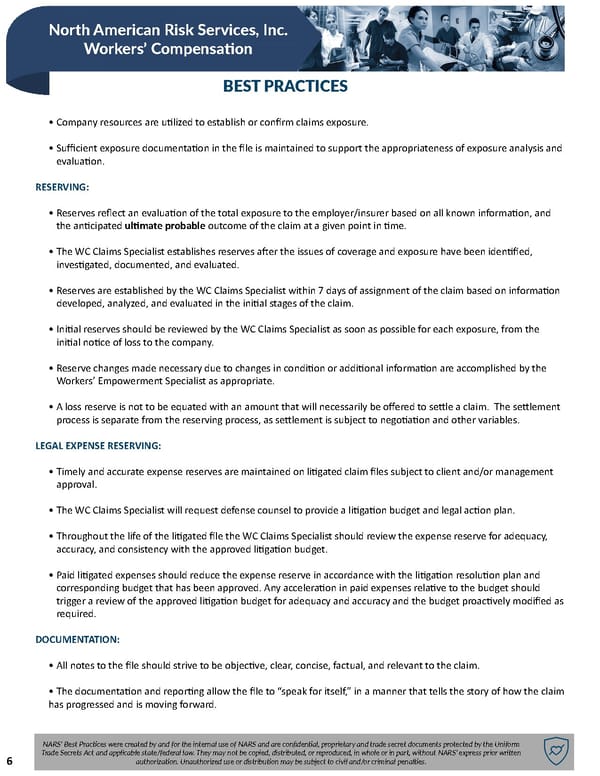North American Risk Services, Inc. Workers’ Compensation BEST PRACTICES • Company resources are utilized to establish or confirm claims exposure. • Sufficient exposure documentation in the file is maintained to support the appropriateness of exposure analysis and evaluation. RESERVING: • Reserves reflect an evaluation of the total exposure to the employer/insurer based on all known information, and the anticipated ultimate probable outcome of the claim at a given point in time. • The WC Claims Specialist establishes reserves after the issues of coverage and exposure have been identified, investigated, documented, and evaluated. • Reserves are established by the WC Claims Specialist within 7 days of assignment of the claim based on information developed, analyzed, and evaluated in the initial stages of the claim. • Initial reserves should be reviewed by the WC Claims Specialist as soon as possible for each exposure, from the initial notice of loss to the company. • Reserve changes made necessary due to changes in condition or additional information are accomplished by the Workers’ Empowerment Specialist as appropriate. • A loss reserve is not to be equated with an amount that will necessarily be offered to settle a claim. The settlement process is separate from the reserving process, as settlement is subject to negotiation and other variables. LEGAL EXPENSE RESERVING: • Timely and accurate expense reserves are maintained on litigated claim files subject to client and/or management approval. • The WC Claims Specialist will request defense counsel to provide a litigation budget and legal action plan. • Throughout the life of the litigated file the WC Claims Specialist should review the expense reserve for adequacy, accuracy, and consistency with the approved litigation budget. • Paid litigated expenses should reduce the expense reserve in accordance with the litigation resolution plan and corresponding budget that has been approved. Any acceleration in paid expenses relative to the budget should trigger a review of the approved litigation budget for adequacy and accuracy and the budget proactively modified as required. DOCUMENTATION: • All notes to the file should strive to be objective, clear, concise, factual, and relevant to the claim. • The documentation and reporting allow the file to “speak for itself,” in a manner that tells the story of how the claim has progressed and is moving forward. NARS’ Best Practices were created by and for the internal use of NARS and are confidential, proprietary and trade secret documents protected by the Uniform Trade Secrets Act and applicable state/federal law. They may not be copied, distributed, or reproduced, in whole or in part, without NARS’ express prior written 6 authorization. Unauthorized use or distribution may be subject to civil and/or criminal penalties. 7
 WC Guidebook single. Page 7 Page 9
WC Guidebook single. Page 7 Page 9